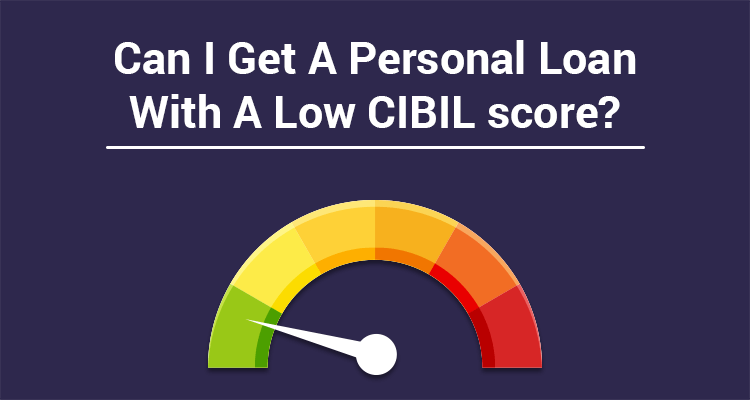Understanding a low CIBIL score and a personal loan is essential for navigating the financial landscape. Your creditworthiness is heavily influenced by your CIBIL score, which lenders use to determine the conditions and availability of loans. Lower scores (300 to 900) indicate poor financial management, making obtaining credit facilities more difficult. Through diligent preparation, you may get beyond the hurdles and get a personal loan. Gaining and keeping a high score on the CIBIL test is no easy feat, but this all-inclusive guide breaks it down into manageable chunks. Your degree of borrowing skill is irrelevant when getting a personal loan with a low CIBIL score.
Understanding the Importance of CIBIL Score
Truly comprehending your CIBIL score extends far beyond a simple numerical figure. It acts as a mirror of your reliability, capacity to handle debt, and general financial conduct. Scoring lower implies less risk for the lender, whereas a higher score indicates a greater risk. Lenders use this figure to evaluate the risk of granting you a loan. A high credit score is a valuable asset in the financial realm, just like an auditor’s keen eye for detail. It demonstrates your reliability to lenders, which can help you secure approvals and obtain more favourable borrowing terms. Dealing with clients with less-than-stellar CIBIL ratings can cause lenders to feel hesitant, as they may have reservations about their credit history. It could result in a lengthier loan approval process.
Challenges Faced by Individuals with Low CIBIL Scores
A low credit score could make the personal loan application process more manageable. Dealing with unfavourable loan terms and meeting strict eligibility criteria may require time and effort. Lenders tend to be more cautious when approving loans for applicants with lower credit scores, as they see a higher risk of default and are, therefore, more concerned about meeting their contractual obligations. Applicants may, thus, encounter higher interest rates, stricter loan eligibility requirements, or even having their loan applications denied. Debt consolidation, home improvements, medical emergencies, or educational expenses are essential for borrowers needing financial assistance.
Acquiring a personal loan with a low CIBIL score may appear challenging but achievable. Through careful planning and strategic execution, individuals can enhance their chances of getting approved for a loan and access the funds necessary to achieve their financial goals. Here are effective strategies to successfully manage personal loans with a low CIBIL score:
Assess Your Financial Situation
Start by conducting a comprehensive evaluation of your financial situation, which includes analysing your income, expenses, debts, and savings. A clear understanding of your financial situation gives you the knowledge to make well-informed choices and create a practical strategy for repaying your debts. Consider creating a budget to track your expenses and identify areas where you can reduce unnecessary spending to allocate more funds for loan repayments.
Review Your Credit Report
Acquiring your credit report from well-established credit agencies like Experian, Equifax, or CIBIL is essential. Carefully examine the report to identify any mistakes, contradictions, or variations that might affect your CIBIL score. Errors such as multiple accounts, outdated information, or unauthorised accounts are common. Ensure your credit report accurately reflects your financial information by taking the necessary steps to correct errors.
Improve Your Credit Score
Approach the task carefully and thoroughly to identify and resolve issues affecting your CIBIL score. It is essential to emphasise the importance of timely debt repayment, adopting a cautious approach to credit utilisation, and avoiding unnecessary credit applications. Prioritising repaying high-interest debts, such as credit card balances, is crucial. With this approach, you can significantly reduce your overall credit utilisation ratio. Consolidating all of your loans into a single loan with a lower interest rate offers the convenience of improved payment management and the potential to enhance your credit score.
Explore Alternative Lending Options
It is strongly recommended to proactively assess the feasibility of investigating alternative options beyond conventional financial systems. The performance of an exhaustive examination of credit unions, peer-to-peer (P2P) lending platforms, and fintech firms is critical. By evaluating these alternative options, users are presented with an expanded selection of loan terms and conditions. Compared to a chief financial officer, P2P lending networks facilitate direct communication between creditors and private investors. Pupils may obtain more favourable interest rates by consulting with a financial expert, who can offer them the opportunity to evaluate financing alternatives customised to their particular requirements. Financial technology (fintech) firms employ sophisticated algorithms and data analytics to determine borrowers’ creditworthiness. Organisations that offer customised financial services are better equipped to meet the unique requirements of each specified client.
Consider Secured Loans
A secured personal loan may be a viable alternative for borrowers whose credit scores fall below the minimum threshold for eligibility for unsecured loans. Including movable property as collateral on loan applications—such as cash, a domicile, or a vehicle—increases the probability of approval. Analogous to how auditors guarantee financial accountability in the event of nonpayment, creditors possess a lawful entitlement to recoup their invested capital through collateral. Regarding unsecured loans, secured loans typically impose more advantageous interest rates and grant consumers an extended repayment period. As a result, specific organisations elect to forge partnerships with clients whose credit scores may fall below the ideal range.
Seek Co-applicants or Guarantors
A co-applicant or guarantor with a strong credit history can be highly beneficial when applying for a loan. Ensuring the co-signer’s financial stability can significantly increase the chances of loan approval, just like how an auditor ensures accuracy and reliability. Every co-applicant undergoes a standardised credit review process and bears equal responsibility for loan repayment, just like the principal applicant. Rest assured that borrowers can be confident that a guarantor will step in to repay their loans if the original lender cannot do so. This arrangement above provides the lender with an extra level of security. Approaching the selection of a co-applicant or guarantor for a loan agreement with a keen eye for detail and a commitment to thoroughness is essential. Understanding their responsibilities and potential outcomes is necessary for all parties involved in the loan agreement.
Negotiate Loan Terms
Approaching lenders to negotiate better loan terms is a prudent decision. Considering different options can be advantageous when making decisions. These include evaluating the potential for decreasing interest rates, extending repayment periods, or finding ways to cut expenses. Providing concrete evidence of improved financial management and highlighting a firm dedication to responsibly paying back the loan is crucial for the borrower. Make sure to prioritise changes that will positively impact your financial situation. Possible changes may involve higher revenues, decreased debt, or enhanced credit behaviour. Lenders may approve their requests if consumers demonstrate a lower credit risk and a higher probability of fulfilling their repayment obligations.
Demonstrate Stable Income
When lenders review your financial records and employment history, they gain a sense of assurance regarding your repayment capacity. To ensure a comprehensive evaluation of your financial situation, we request that you submit the necessary supporting documents, including income tax returns, job contracts, and salary receipts. When filing a loan application, it is crucial to highlight any recent career advancements or changes in income. Financial institutions are more likely to approve loan applications from individuals with a consistent work history and a reliable source of income, just as an auditor would expect.
With a meticulous approach to completing the application and a keen eye for detail, individuals with a below-average credit score can increase their chances of securing a personal loan by actively working to improve their creditworthiness. With a careful and thorough approach to improving your credit score, analysing your credit report, and assessing your financial situation, you can significantly increase your chances of getting approved for a loan and obtaining the funds you need to achieve your financial goals. It is beneficial to explore additional lending options to strengthen your loan application. These options include finding a companion, securing a guarantor, or applying for secured loans. Engaging in productive conversations with lenders is essential to obtain more favourable loan terms.
Furthermore, submitting the necessary documentation demonstrating a consistent income can significantly enhance the borrower’s credibility in repaying the loan. With a meticulous and logical approach, individuals can improve their skills in managing personal loans, regardless of their credit score. Approaching financial projects with a keen eye for detail dramatically increases the chances of achieving success.
Conclusion
A low CIBIL score will make receiving a personal loan more complicated but not impossible. Consider a borrower who meets the following criteria: they have a steady income, are willing to accept lesser loan amounts, have co-applicants or guarantors, have their credit report errors corrected, and are open to exploring alternative lending options. If that occurs, their chances of getting a loan might improve. Careful preparation and timely payments are essential to avoid further declines in the CIBIL score. Strategic planning and sound financial management may help you acquire the money you need to reach your goals. If individuals try to raise their credit and understand the ins and outs of the financial world, they may ultimately achieve their financial goals even with a low CIBIL score.




